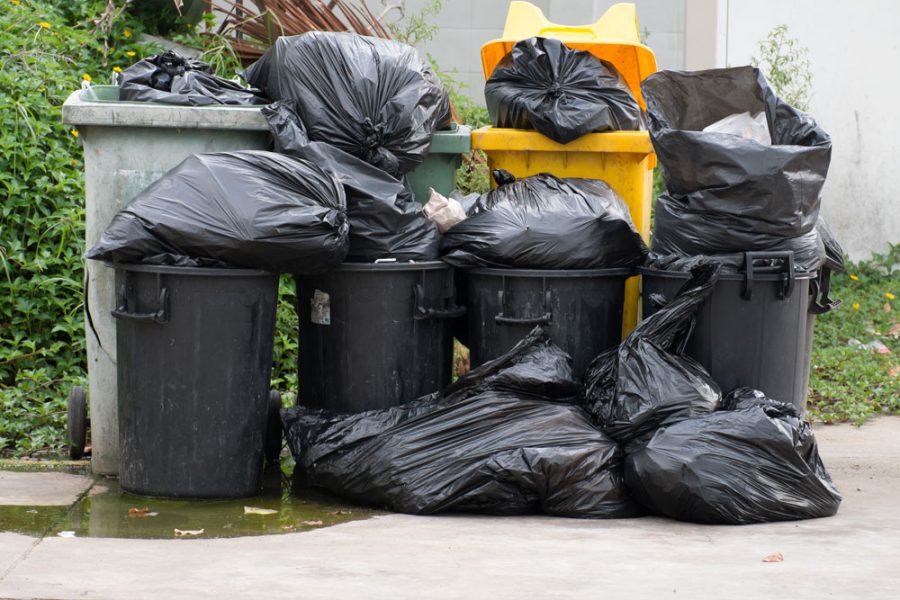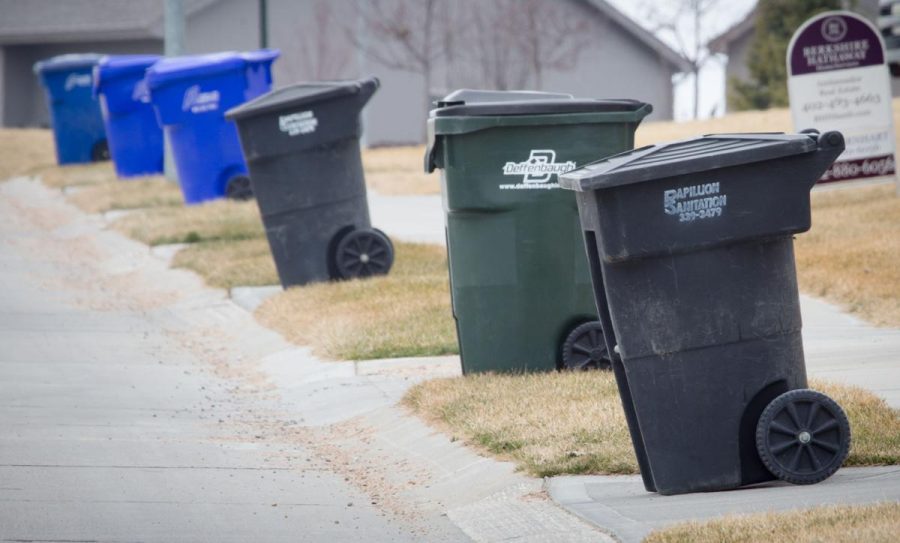Recycling
January 23, 2020
Trash talk
Overflowing trash cans is one of many problems that the current companies neglect to change. With the FCC’s new plan hopefully overflowing cans along with all the other issues will go away.
The constant overflowing, breaking and the late pickups by trash companies that should be doing their job to perfection is finally getting solved in 2021.
On Aug. 27, the Omaha City Council voted 4-3 along with the mayor Jean Stothert’s vote in favor of a new plan. The new trash company taking over will be the FCC Environmental of Spain, they provide sanitation services to all of Spain and many other European countries. The new deal will last for 10 years and cost $2.4 million per year for a total of $24.2 million.
Starting Jan. 1, 2021, residents will begin to set out two 96 gallon trash bins, one of the bins will be for basic trash along with yard waste to be picked up every week, the other bin will be strictly for recycling and will be picked up every other week. Families with five or more household members can apply for a third bin which the city will pay for. Citizens will also be able to apply for smaller bins if 96 gallons is to big for them or their family.
City Council members Aimee Melton and Ben Gray were pleased with how they thought the new deal was exactly what they were looking for. They believe that this new plan would solve many of the recurring problems that the current companies have such as breaking cans and being late on days of pickup.
In an interview by KETV news on Aug. 27, Melton said, “At this point in time, I think the mayor has delivered on what I asked for. I wanted covered carts, separate yard waste.”
Melton was looking for the carts to be covered and to have a bin that could hold all of his yard waste. With the FCC’s new carts, all of his wishes will be granted.
In the same story by KETV, Gray said, “I went with FCC, primarily because if there were some issues that came up, it was my feeling that perhaps, maybe they would be the best ones to handle it if there were some glitches and so forth.”
Gray was pleased with the plan the FCC brought forward. He felt like the FCC would be able to resolve any issues that came up in an efficient manner, something that the current trash companies seem to have a problem with.
Personally, I completely love this plan and feel like it was the change that the city of Omaha needed. There are a lot of issues and mishaps with the current trash companies. It’s no secret that they should try to do a better job, the cans always crack and they are constantly late on days of pickup. This is just unacceptable from such prominent companies, and they shouldn’t allow things like that to happen. I strongly feel that a change is needed, hopefully this new company can make the much needed changes and get the problem resolved. The city of Omaha needed a change in the garbage disposal aspect of the city and hopefully the FCC can be the answer to all of Omaha’s problems.
The FCC prides itself on sanitizing the 46 million people in Spain, so hopefully there isn’t any problems doing it for the 466 thousand people in Omaha. We will be able to judge their credibility in the future. Now we wait for salvation in 2021.
Curbside catastrophe
Photo by Kent Sievers at the Omaha World Herald
Omaha trash bins will be replaced with 96 gallon cans similar to these in the start of 2021 following the new contract for waste.
For the duration of previous trash pickup in Omaha, there has been little to no city-wide regulations on the weekly curbside pickups. Select neighborhoods have regulations on their waste regarding bin standards including size, distinctions between recycling, trash and extra yard waste, all of which the new changes to the Omaha trash regulations include.
Set to launch in 2021, all households will be receiving these new and “improved” green and blue bins at least 90 days prior to the first official pickup date as reported by the City of Omaha Website. Unless special circumstances apply, the average household will obtain a 96-gallon trash container meant for both normal and yard waste bags. This plan is meant to make pickup easier and more efficient, but those with larger landscaping debris will struggle with the overload of bags needed to be taken care of. A household must pay for a $2 sticker that allows for extra yard bags to be placed next to the designated bins making a weekly chore into a weekly labor.
Not only does paying for a sticker to properly dispose of yard waste cost an unnecessary amount of money, but if one would rather compost their chopped greenery, they must haul their load to the Omaha-Gro center in Bellevue themselves. The only other time to get rid of the waste would be to set an unlimited amount of bags out on the appointed days in spring and fall. This arguably takes time out of the day for those who are interested in being environmentally cautious and makes the option less desirable compared to the compost usually being taken at the curb. Adding these yard bags to the landfill will create a problem if fewer people choose to compost based on the amount of pollution from landfill gas in the air.
The cost of this new plan includes the disposal of old receptacles and the emergence of the new bins. According to the Omaha World Herald, the FCC Environmental of Spain offered to not charge the city to recycle the previous cans as long as there was a guarantee that the trash bid went through. West Central Sanitation of Minnesota, on the other hand, would have charged the city up to $500,000 to recycle the containers disconnected from the FCC although they would have overall had a lower bid. Mayor Jean Stothert, however, turned down the West Central Sanitation of Minnesota worried that the disposal company would not grow large enough for the city of Omaha in time.
Having decided on how to dispose of the estimated 500,000 bins, the cost of putting the recently developed carts in place will be the real problem. With the FCC Environmental of Spain, the entire plan will cost a hefty $24.2 million dollars, a higher overall price than what was offered by the West Central Sanitation of Minnesota involving a three cart alternative.
Although Mayor Stothert claims taxes will not be raised, the 2020 and beyond budget with the included FCC plan will take away from other important parts of the Omaha tax funds. For example, a major change will be made to the health care employee budget reducing it by $1 million, not only affecting the workforce but the retirees. Not taking the lower bid and not raising taxes will continue to cause problems that will affect the budget in the future taking away from more dire city-wide issues.
Disposing of the current non-regulation trash and recycling bins for 2021 is calling for an incredible amount of plastic waste, as well. With an estimated minimum of 500,000 old trash cans to get rid of and 100,000 recycling bins, the FCC has claimed to recycle the eligible leftovers. However, if the previous containers are in bad condition, being too old or debased, they must be simply junked to the landfill left to pollute instead of recovering the plastic. This will be another cost on the Omaha budget, but it is hard to estimate the total until the day comes when all the receptacles have been sorted once the official plan starts.
The choice having been made already makes the decision final but the impact less so. If recognized now, Omaha residents can be more aware of their environmental impact especially considering taking the time out of their day to compost what they can and cleaning their bins in hopes to be considered for recycling by the FCC. Optimistically, the new recycling carts will push more households to branch out of the waste-only lifestyle and consider the future outside of landfills.

